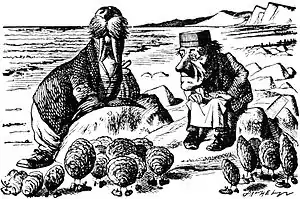The Walrus and the Carpenter
"The Walrus and the Carpenter" is a narrative poem by Lewis Carroll that appears in his book Through the Looking-Glass, published in December 1871. The poem is recited in chapter four, by Tweedledum and Tweedledee to Alice.

Summary
"The time has come," the Walrus said,
"To talk of many things:
Of shoes—and ships—and sealing-wax—
Of cabbages—and kings—
And why the sea is boiling hot—
And whether pigs have wings."[1]
The poem tells the story of a walrus and a carpenter who meet on a beach and decide to go for a walk. They come across a group of oysters, and the walrus persuades them to come with them. The oysters follow the walrus and the carpenter, and they are eventually all eaten.
Interpretations
The characters of the Walrus and the Carpenter have been interpreted many ways both in literary criticism and popular culture. British essayist J. B. Priestley argued that the figures were political.[2] Walter Russell Mead supposed they represent aspects of Protestant and Transcendentalist societies during Carroll’s life.[3]
The 1967 The Beatles song "I Am the Walrus", which is based on the poem, is also a common subject of nonsense inquiry.[4] John Lennon later inferred Carroll’s views on capitalism from the poem, joking that perhaps he should have instead sung "I Am The Carpenter."[5]
See also
References
- Carroll, Lewis (1872). Through the Looking Glass : and what Alice found there. London: Macmillan and Co. pp. 75-76.
- Priestley, J. B. (10 August 1957). "The Walrus and the Carpenter". New Statesman. p. 168.
- Mead, Walter Russell (2007). God and Gold. London: Atlantic Books. pp. 43–45. ISBN 978-1-84354-724-2.
As the poem opens, the Walrus and the Carpenter—who, we can suppose, allegorically and respectively represent Britain and the United States—have worked themselves into a typically Protestant and Anglo-Saxon froth of transcendental idealism.
- MacDonald, Ian (2005). Revolution in the Head: The Beatles' Records and the Sixties. Chicago, IL: Chicago Review Press. p. 268. ISBN 978-1-55652-733-3.
- Sheff, David (2000). All We Are Saying: The Last Major Interview with John Lennon and Yoko Ono. New York: St. Martin's Press. p. 185. ISBN 0-312-25464-4.
Further reading
- Gardner, Martin (1999). The Annotated Alice: The Definitive Edition. W. W. Norton & Company. ISBN 0393048470.
External links
 Works related to The Walrus and the Carpenter at Wikisource
Works related to The Walrus and the Carpenter at Wikisource Media related to The Walrus and the Carpenter at Wikimedia Commons
Media related to The Walrus and the Carpenter at Wikimedia Commons The Walrus and the Carpenter public domain audiobook at LibriVox
The Walrus and the Carpenter public domain audiobook at LibriVox